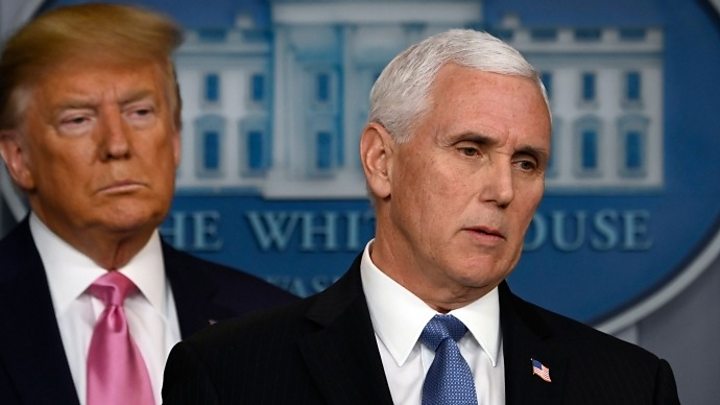This website uses cookies so that we can provide you with the best user experience possible. Cookie information is stored in your browser and performs functions such as recognising you when you return to our website and helping our team to understand which sections of the website you find most interesting and useful.

Media playback is unsupported on your device
US President Trump has appointed his Vice-President Mike Pence to coordinate the government response to the coronavirus outbreak.
Both men told a White House news conference that the risk to the American people remained very low.
The announcement came as new cases of Covid-19, the infection caused by the Wuhan coronavirus, continue to spread at a rapid pace around the world.
Sixty cases have so far been reported in the US.
Minutes after the White House news conference, the authorities confirmed another US case of Covid-19.
Addressing the press, Mr Trump expressed confidence that the US would be able to handle coronavirus.
"We're very, very ready for this," Mr Trump said. Researchers were "rapidly developing" a vaccine, he said.
However, Anthony Fauci, Director of the National Institute of Allergy and Infectious Diseases, said he did not expect a vaccine to be ready for a year to a year-and-a-half at the earliest.
The news conference came as Mr Trump was criticised for earlier suggesting in a tweet that the media had fanned unnecessary alarm over coronavirus "to make the Caronavirus [sic] look as bad as possible".
"USA in great shape!" he tweeted.
However, he admitted at his news conference that the US should prepare in case the virus spread. "Every aspect of our society should be prepared," he said.
He contradicted public health officials who earlier warned that spread of the virus to the US was a matter of when, not if. "I don't think it is inevitable," Mr Trump told reporters.
He credited decisions to limit certain flights into the US with containing the number of infections.
Alex Azar, the US health secretary, said the White House had developed a plan to focus on five priorities, including better disease surveillance, local government response coordination, developing therapeutics, and increasing manufacturing of personal health protection equipment, like masks.
More US cases are to be expected, Mr Azar said.



 Africana55 Radio
Africana55 Radio 
